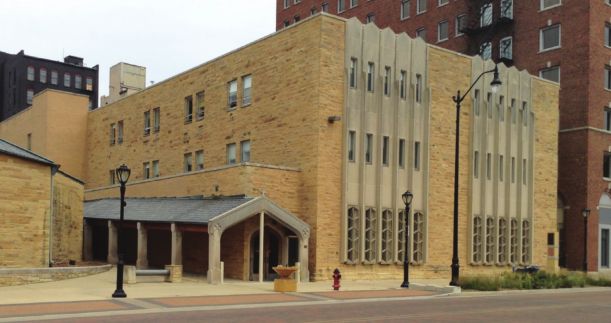
Torn asunder
Downtown plan fizzles
COURTS | Bruce Rushton
Plans for apartments, shops and a cultural center at an empty downtown church in Springfield are on the rocks.
Former Ward 8 Ald. Irv Smith has sued his partner in the project, developer Dan Mulcahy, claiming that Mulcahy has inappropriately written checks and applied for a credit card in the name of the company the two formed earlier this year to renovate the former First United Methodist Church at the intersection of Fifth Street and Capitol Avenue. Saying that Smith had a likelihood of winning his lawsuit, Sangamon County Circuit Court Judge Pete Cavanagh last month issued an injunction against Mulcahy, prohibiting him from taking any action to develop the site.
The property has been vacant for six years.
Victoria Ringer, executive director of Downtown Springfield, Inc., says it’s a key site in the push to redevelop and revitalize downtown.
“I think it’s going to be just as much a catalyst as the Y(WCA) block,” said Ringer, referring to a tract near the governor’s mansion that the city recently acquired and plans to redevelop.
Citing a gag order issued by Cavanagh, neither Mulcahy, who is representing himself, nor attorneys for Smith would comment.
Cavanagh in his August injunction prohibited Mulcahy from spending any money from Smith, whom the judge found had contributed $250,000 toward the project while Mulcahy contributed nothing. In his lawsuit, Smith says that Mulcahy promised to contribute $100,000 from the sale of his home, but didn’t follow through. In an Aug. 5 letter preceding the filing of the lawsuit, Charles Gramlich, Smith’s attorney, warned Mulcahy about living arrangements.
“We have reason to believe that you will soon be homeless,” Gramlich wrote. “If you choose to move into the company property (church) at 501 E. Capitol Ave. and use it as your residence without the express permission of Mr. Smith, you will precipitate immediate legal action.”
In the letter, Gramlich also warned that the future of the company formed to redevelop the former church was at stake.
“If you force a dissolution of this venture, both you and Mr. Smith will lose,” Gramlich wrote. “If you don’t recognize that, you lack common sense.”
Smith filed suit nine days later, asking that the company be dissolved.
In his lawsuit, Smith says that Mulcahy approached him in January, shortly after the death of Smith’s wife, to invite him to invest in the church property. Smith agreed and, at Mulcahy’s demand, wrote $250,000 in two checks to a company owned by Mulcahy, who purchased the property in his company’s name instead of a company the two had formed to develop condominiums at the church site, according to Smith’s lawsuit. Over his objections, Smith says that Mulcahy started making plans to develop a cultural center at the site.
Smith says that Mulcahy received a $9,500 commission from the seller of the property, then demanded a $25,000 finder’s fee from Smith without telling the former alderman that he had already received a commission. Mulcahy, Smith claims, has also refused demands to open a bank account requiring two signatures. In his lawsuit, Smith also accuses Mulcahy of failing to fully account for funds.
In a written reply, Mulcahy says that Smith approached him, not the other way around, and offered $600,000 for the project.
“I told him I would NOT take $600,000 from anyone, let alone a friend for over 40 years who was 85 years old,” wrote Mulcahy, who was a pallbearer at the funeral for Smith’s wife.
In his written reply to the lawsuit Mulcahy denies allegations of wrongdoing and says there was never an intention to build condominiums on the property, nor did he pledge $100,000 from the sale of his home. He says that he never objected to a twosignature bank account and says that Smith either skipped or arrived late to meetings with contractors, architects and others.
Contact Bruce Rushton at [email protected].